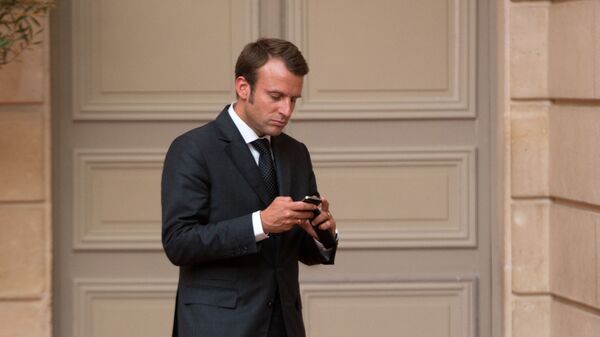Political analyst Mateusz Piskorski has offered his stance on why French President Emmanuel Macron’s jab at "brain dead" NATO has spraked the indignation in Polish political circles.
Sputnik: What new did the French President say, and why did it cause such a resonance?
Mateusz Piskorski: That’s what you should think about. Given the previous statements by politicians in both Paris and Berlin, the opinion of NATO, especially since Donald Trump’s taking office, is becoming increasingly skeptical. This is largely due to the personality of the American President and his unceremonious statements. After all, it was he who initiated a pressure campaign against the Western European NATO members with his demands to increase defense budgets to 2% of the GDP, of course, offering to buy weapons from American manufacturers.
The European NATO member states had to somehow react to this, at least considering public opinion. Voices consonant with Macron’s statement appeared earlier. There is nothing new here, except that only the nature of the statements has become sharper.
Sputnik: The Polish media draw attention to the fact that the Germans disassociated themselves from Macron’s position, that there was some kind of gap in the Berlin-Paris alliance…
Mateusz Piskorski: Of course, German politicians, including Chancellor Angela Merkel, Foreign Minister Heiko Maas or the new European Commission President Ursula von der Leyen, were vigilant and have prudently distanced themselves from Macron’s statement. It should be emphasised that the Germans have once again expressed their support for the initiative of establishing the European Security Council as a new formula for implementing a more integrated European defence policy.
Thus, on the one hand, there is criticism in Berlin, and on the other hand, there is an attempt to move in the direction of an independent European defence policy. And ritual comments about the strength of the idea of the transatlantic alliance don’t interfere with this.
Sputnik: What are the reasons for concern among the Polish elite?
Mateusz Piskorski: Given their unconditional consent to American control of the Old World, some representatives of the establishment actually felt lonely. It’s important to understand that we are dealing with a pro-American consensus. Comments in the Gazeta Polska don’t differ much from the statements published in the Gazeta Wyborcza. Everywhere we see the fright over Emmanuel Macron’s statement about the need for dialogue with Russia.
Extremely negative for the PiS (Law and Justice Party) is the French President’s statement about Hungarian Prime Minister Viktor Orban. It was Budapest that Emmanuel Macron called the leader of the Central European states. And he is right. Today, in the region we are dealing with a war block of neoconservatives, consisting of Poland and the Baltic countries, which Romania sometimes joins.
According to the French president, an alternative bloc is possible, more representative of the region than the one that includes Poland. It’s easy to imagine that it can appear in Hungary, Slovakia, the Czech Republic and the Balkan countries. The potentials of both blocs would be comparable, perhaps even with a slight advantage of the non-pro-American bloc in certain areas.
Sputnik: Could rivalry arise between such blocs in the Central European region?
Mateusz Piskorski: Of course, you would have to deal with two groups diametrically opposed to each other: one is sovereign, realistic and pragmatic; the other is irrational, suffering from many phobias and dependent on Washington. For most relatively independent Central European countries, the choice would be obvious in this context. But one must also reckon with Washington’s pressure on all subjects. In short, if we imagine such a scenario, then the idea of the Three Seas, put forward by the PiS party, will be a thing of the past, as well as the project to turn Poland into a distribution centre for American liquefied gas.
Sputnik: Could such media activity of Macron lead to some kind of crisis in the Polish-French relations?
Mateusz Piskorski: Actually, Polish-French relations are in a state of permanent crisis from the moment of PiS coming to power. Nothing new will happen, since it’s difficult to even imagine the further deterioration of these relations. Caustic comments and even insulting epithets regarding the French President appear in the media and the statements of politicians. Some even call him the Kremlin’s “useful idiot,” forgetting their own, much less useful, idiocy in their relations with the White House. Frankly, these people react so painfully only because Macron’s statement was positively accepted by Moscow.
In their opinion, everything that provokes a favourable reaction from Russia contradicts the interests of Poland. However, I doubt that we’ll see aggressive attacks in France, except that the French embassy will say something. I think that Europe is currently dealing with more important things than comments from a couple of hundred annoyed people in Poland. Macron said fairly obvious things, based on a realistic assessment of the situation in the international arena. Of course, Polish politicians could objectively argue with his theses, even try to refute his arguments.
They don’t care much about Macron with his opinion about NATO, since he is just another “influence agent” of Moscow. This is the absurdity we live today in Poland.

